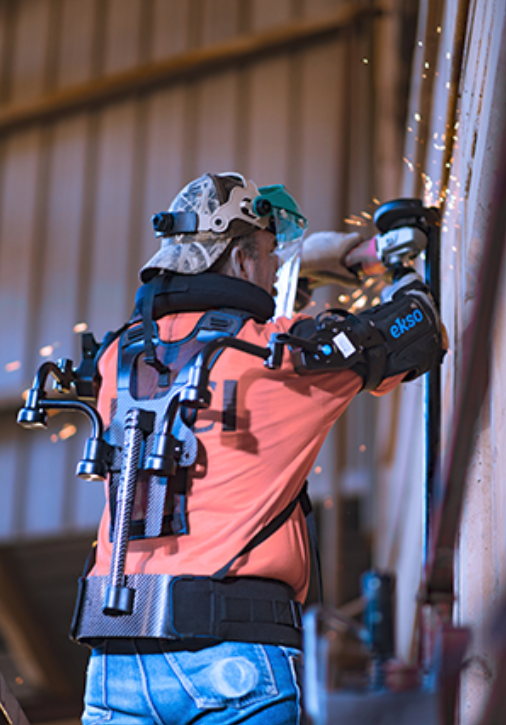Supporting the supply chain with emerging technology

At a time when the construction industry is facing a steady decline of worker retention, using emerging technology to protect individual welfare and improve long-term health and wellbeing is an essential move to drive progress and change.
How does it work?
EksoVest – from robotics company Eksobionics - is a form of wearable technology that works with humans, rather than replacing them. It enhances the wearer’s natural physical strength, by reducing the stresses and strains associated with manual tasks.
Contrary to popular belief, it is not a robot: it is human-controlled and contains no electronics, although it could signify the advent of advanced technology in construction, which is long overdue in its methods and practices.
The technology is optimised to support weight on the arms when working overhead, safely transferring loads through a ‘secondary’ skeletal system, down to the upper legs. A spring-based assistance system provides 5-15lbs of lift assistance per arm: this is relatively simple technology used in a smart way, and could prove revolutionary for construction workers onsite.
In the short-term, users feel less exerted at the end of the day, whilst in the long-term, it may be able to extend their working life through improved health and wellbeing, something that is important when industry retention figures are declining.
Chris Townsend
Design Manager, Willmott Dixon
Whilst it is exciting to see emerging technology in construction becoming a reality, we must remember that the vest’s primary function is to reduce human risk and protect worker welfare rather than replace people.

Embracing innovation
We are consistently looking at how our industry can adapt to new challenges and harness the best technology to increase productivity and safety, which includes greater focus on behaviours as well as technology.
Funded by Eureka, Willmott Dixon’s central research and development fund, the EksoVest, which costs approximately £5,650, is being trialled on the Cardiff West Community High School site. The technology will then be demonstrated at other sites across the country before being introducing as standard, depending on how the trials perform.
New technologies will play a fundamental role as the construction sector strives to be regarded as forward-thinking and progressive as other industries.
Innovation is in our DNA and this could revolutionise the ability to perform manual tasks. The wellbeing of our people and supply chain is always our number one priority and the more we can use technology to support this, the better.
Neal Stephens
Managing Director, Willmott Dixon (Wales and South West)

Written by:
Chris Townsend
Design Manager
Related news

SCAPE's Mandatory & Optional Environmental Standards Set the Benchmark for Compliance and Best Practice
27/11/2025

SCAPE Utilities Frameworks supports £300m of UK port development
17/09/2025

Tier 1, Tier 2 and Tier 3 construction contractors – what’s the difference?
20/08/2025
